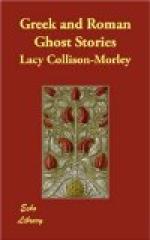“The stranger Machates, who was visited by the ghost, has committed suicide in despair.
“Now, if you think it right that I should give the King an account of all this, let me know, and I will send some of those who gave me the various details.”
The story is particularly interesting, as the source of Goethe’s Braut von Korinth. In Goethe’s poem the girl is a Christian, while her lover is a pagan. Their parents are friends, and they have been betrothed in their youth. He comes to stay with her parents, knowing nothing of her death, when she appears to him. As in the Greek story, her body is material, though cold and bloodless, and he thinks her still alive. He takes her in his arms and kisses her back to life and love, breathing his own passion into her. Then the mother surprises them, and the daughter upbraids her for her cruelty, but begs that she and her lover may be buried together, as he must pay for the life he has given her with his own.
FOOTNOTES:
[Footnote 79: Philops., 27.]
[Footnote 80: Herod., v. 92.]
[Footnote 81: Human Personality, ii. 348.]
[Footnote 82: Ep., v. 5.]
[Footnote 83: Suet., Gaius, 59.]
[Footnote 84: Suet., Otho, 7.]
[Footnote 85: If that is the meaning of [Greek: exerruparou] in the Homeric Scholia of Theopompus.]
[Footnote 86: Cic., De Div., i. 27, 56. Cp. Val. Max., i. 7; Libanius, iv. 1101.]
[Footnote 87: The Grateful Dead, by G.H. Gerould.]
[Footnote 88: The Grateful Dead, p. 27.]
[Footnote 89: Ibid., p. 10.]
[Footnote 90: 6. 6. 7.]
[Footnote 91: AElian, Fragm., 82.]
[Footnote 92: Herod., iv. 14, 15.]
[Footnote 93: Hist. Mir., 11.]
[Footnote 94: N.H., 7. 52. 174.]




